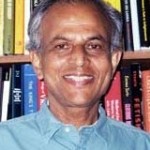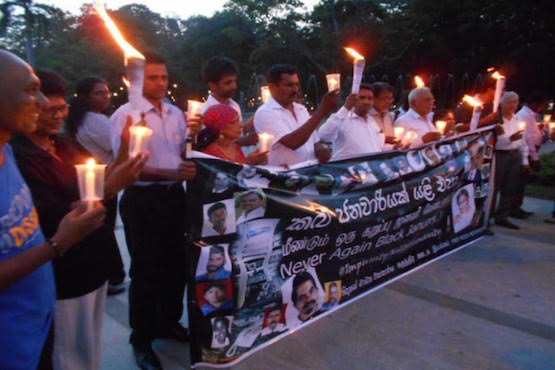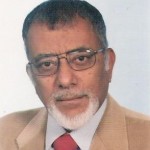
Six year ago, Sri Lankan political cartoonist and columnist Prageeth
Ekneligoda left his office and was never seen again. Since then his
family have never stopped searching for the truth behind his
disappearance.
"I started to demand justice for my father when I was age 14," says
Ekneligoda's eldest son Sanjaya. "We will never give up until we find
who was behind the disappearance."
Sanjaya's father went missing two days before 2010's presidential elections, a period marred by widespread violence.
Ekneligoda was then working for
Lanka eNews, an independent
online publication that backed political opposition leader Gen. Sarath
Fonseka. As a journalist, Ekneligoda reported on
alleged corruption among family members of Mahinda Rajapaksa who was the country's president from November 2005 to January 2015.
Investigations into Ekneligoda's disappearance were reopened by Sri
Lanka's current president, Maithripala Sirisena, in March last year. By
August, several military intelligence officers were charged with
Ekneligoda's disappearance.
Sanjaya is pleased progress has been made into the investigations but he
fears people of influence are interfering with the case behind the
scenes.
Despite this, Sanjaya said his mother has never given up hope in finding justice for her husband.
"My mother is a courageous woman," said Sanjaya. "She went everywhere to
make her voice heard, even to the United Nations to get support for the
investigations but not only for my father but also for all the
disappearances of other media workers over the years," he said.
The family of missing Sri Lankan journalist Prageeth Ekneligoda
attended an exhibition at the Goethe Institute in Colombo that marked
his sixth year of disappearance. Sanjaya Ekneligoda, right, his mother
Sandya and younger brother Dhananja are still seeking answers to
Prageeth's fate. (Photo by Niranjani Roland)
Black January
Since 2011, January has been used as a month to draw attention to the
killing and forced disappearance of journalists in Sri Lanka.
Seetha Ranjani, convener of the Free Media Movement, Sri Lanka, told
ucanews.com that during former President Rajapaksa's rule the media was
suppressed.
"After
Sri Lanka's civil war ended in 2009, the media and journalists faced many difficulties in the country," said Ranjani.
"There were many awful incidents that took place during the month of January," she said.
Among those incidents was the case of Lasantha Wickrematunge who was
killed in January, 2009. The veteran journalist was shot dead in a broad
daylight on a public highway, a few hundred meters from a security
checkpoint.
Another journalist, Subramaniyam Sugitharajah, was killed on Jan. 24,
2006. It was the same day the photos he took of dead Tamil students
murdered by the Sri Lankan army were published.
Through initiatives such as Black January, Sri Lankan journalists are
pressing the government to fully address the country's history of media
suppression.
Since the election of President Maithripala Sirisena in January 2015,
the new government has showed a willingness to acknowledge past abuses
and commit to reforms.
As part of that they have promised to combat a culture of impunity that emboldens assailants.
Prime Minister Ranil Wickremesinghe told parliament last December that the government would pay compensation to the families of
44 journalists who have been killed.
Tamil journalists
However there has been little government support forthcoming to investigate the deaths of Tamil journalists.
Thev Athiran, president of Federation of Eastern Journalists, told
ucanews.com that he hasn't seen any progress in the investigations into
Tamil journalists who have been murdered.
"Most of the families of killed Tamil journalists have left the country due to fear," said Athiran.
"Sugirtharajan's wife was frustrated that none of the investigations was carried out," he said Athiran.
"Several times she has gone to the police regarding the investigations
and in 10 years there has been no headway in solving his murder," he
said.
Father Terrance Fernando, who also is an activist for Sri Lankan media freedom, said that perpetrators have not been punished.
"It is a pathetic situation that none of the investigations have started
for the killings of Tamil journalists," said the priest who work's in
the country's north.
"The local church does not play a prominent role in putting pressure on the government in this regards," the priest worried.




 Journalists
commemorate Black January on Jan. 21 in Colombo and call on the
government to further investigate past killings and enforced
disappearances of media workers. (Photo by Quintus Colombage)
Journalists
commemorate Black January on Jan. 21 in Colombo and call on the
government to further investigate past killings and enforced
disappearances of media workers. (Photo by Quintus Colombage)




